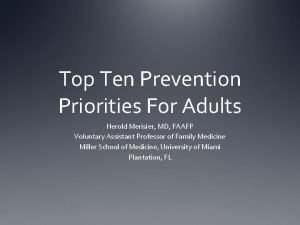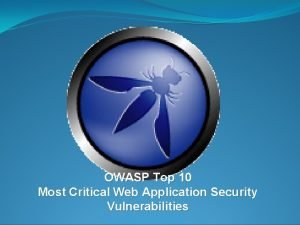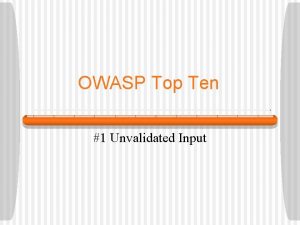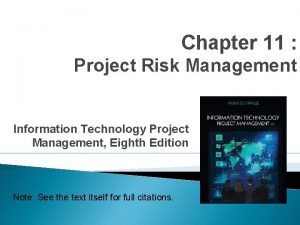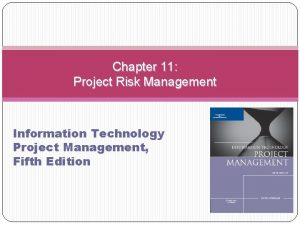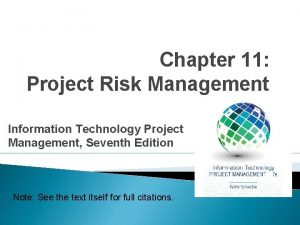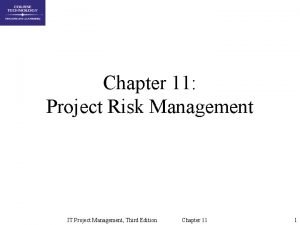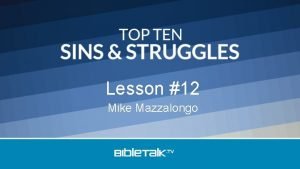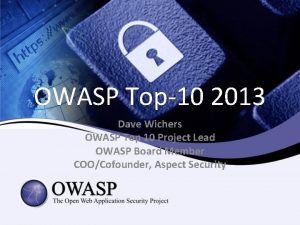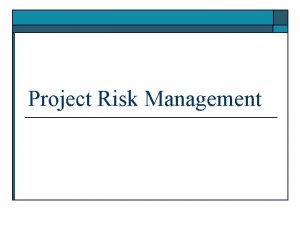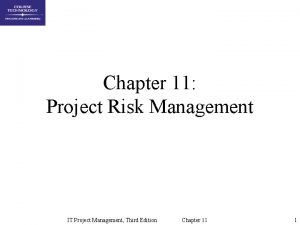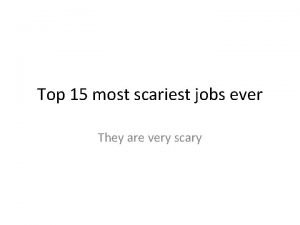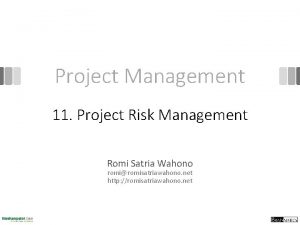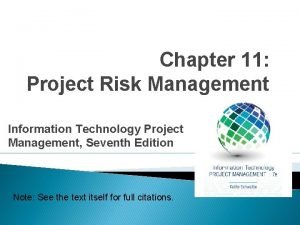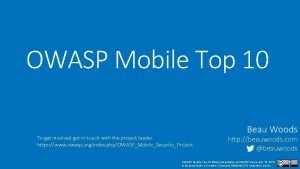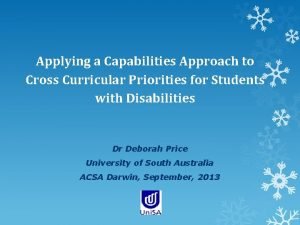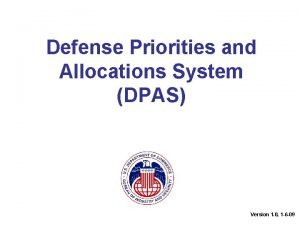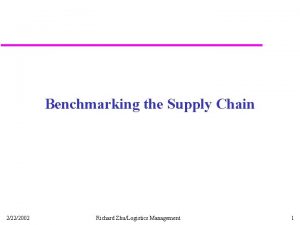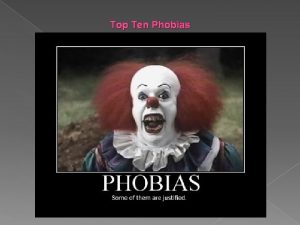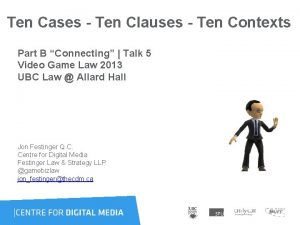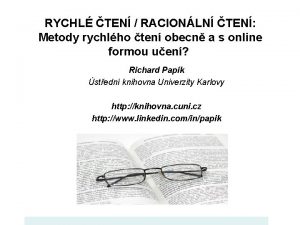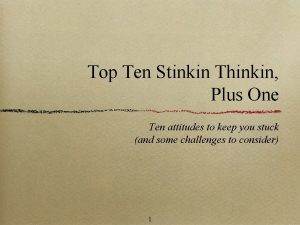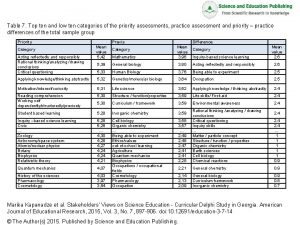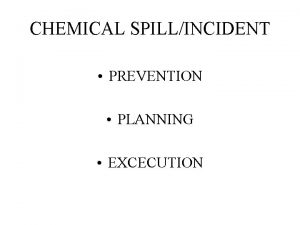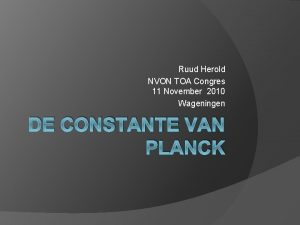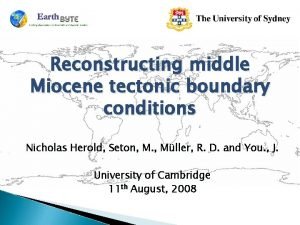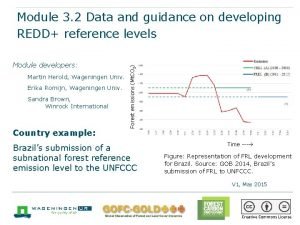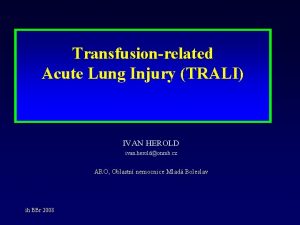Top Ten Prevention Priorities For Adults Herold Merisier































- Slides: 31

Top Ten Prevention Priorities For Adults Herold Merisier, MD, FAAFP Voluntary Assistant Professor of Family Medicine Miller School of Medicine, University of Miami Plantation, FL

“The doctor of the future will give no medicine, but will interest his patients in the care of the human frame, in diet, and in the cause and prevention of disease. ” Unknown Author

Preventive Measures Multiple recommendations have been published to help physicians guide their patients Abundance of recommendations How do we prioritize the information?

Methodology The National Commission on Prevention Priorities (NCPP) of the U. S. Preventive Services Task Force (USPSTF) Ranking of clinical preventive services up to Dec. 2004 Each service received 1 to 5 points on each of two measures: clinically preventable burden cost effectiveness for a total score ranging from 2 to 10 Am J Prev Med. 2001 Jul; 21(1): 10 -9 Am J Prev Med. 2006 Jul; 31(1): 90 -6

Clinically Preventable Burden Total quality- adjusted years of life (QALYs) gained If the clinical preventive service were delivered at recommended intervals To a U. S. birth cohort of 4 million individuals over the years of life for which a service was recommended

Cost Effectiveness Average net cost per QALY gained In a typical practice By offering the clinical preventive service at recommended intervals to a U. S. birth cohort over the recommended age range

Scoring Ranges

Top 5 Priorities Services CPB CE Aspirin Chemoprophylaxis 5 5 10 Childhood Immunization 5 5 10 Tobacco-Use Screening/Intervention 5 5 10 Colorectal Cancer Screening 4 4 8 Hypertension Screening 5 3 8 CPB: Clinically Preventable Burden CE: Cost Effectiveness Am J Prev Med. 2006 Jul; 31(1): 90 -6 Total

1. Aspirin Chemoprophylaxis Risk reduction: Men, ages 45 -79, to prevent MI’s Women, ages 55 -79, to prevent strokes Optimal dose: 81 -162 mg/day Higher dose -> Higher risk of GI bleed Avoid: Patients with history of GI bleed Patients allergic to Aspirin

2. Tobacco Use Screening/Intervention Screen adults for tobacco use Provide brief counseling Offer pharmacotherapy

Smoking Cessation: 5 A’s Intervention Issue Ask About tobacco use Advise To quit Assess Willingness to quit Assist In quit attempt Arrange For follow-up

Smoking Cessation: 5 R’s Assessment Issue Relevance Encourage the smoker to identify why quitting is personally relevant Risks Ask the smoker to identify negative consequences of continued tobacco use Rewards Ask the smoker to identify and discuss specific benefits of quitting Roadblocks Assist the smoker to identify specific barriers and impediment to quitting Repetition Reinforce the motivational message at every opportunity Reassure that repeated quit attempts are not unusual

Motivational Interviewing “Motivational interviewing is a directive, clientcentered counseling style for eliciting behavior change by helping clients to explore and resolve ambivalence”

Motivational Interviewing Motivation to change is elicited from the client, and not imposed from without It is the client's task, not the counselor's, to articulate and resolve his or her ambivalence Direct persuasion is not an effective method for resolving ambivalence Readiness to change is not a client trait, but a fluctuating product of interpersonal interaction The therapeutic relationship is more like a partnership or companionship than expert/recipient roles Available at: http: //www. motivationalinterviewing. org

Smoking Cessation: Rx Nicotine Replacement Therapy Gum Patch Inhaler Nasal Spray Lozenge Bupropion (Zyban®) Varenicline (Chantix®) Combination Therapy

3. Colorectal Cancer Screening Second leading cause of cancer death in the US after lung cancer CRC largely can be prevented by the detection and removal of adenomatous polyps Survival is significantly better when CRC is diagnosed while still localized

3. Colorectal Cancer Screening Fecal occult blood test: g. FOBT (Guaic Fecal Occult Blood Test) FIT (Fecal Immunochemical Test) s. DNA (Stool DNA) Flexible sigmoidoscopy Screening colonoscopy Barium enema

3. Colorectal Cancer Screening CA Cancer J Clin 2008; 58: 130– 160

4. Hypertension Screening Leading cause of heart attack, stroke, and heart failure Evidence lacking regarding optimal interval for screening adults for hypertension JNC 7 recommends screening: Every 2 years in persons with blood pressure < 120/80 mm Hg Every year with systolic blood pressure of 120 to 139 mm Hg or diastolic blood pressure of 80 to 89 mm Hg

5. Influenza/Pneumococcal Immunization Service Description Influenza Immunization Immunize adults aged ≥ 50 against influenza annually Pneumococcal Immunize adults aged ≥ 65 Immunization against pneumococcal disease with one dose for most in this population CPB: Clinically Preventable Burden CE: Cost Effectiveness Am J Prev Med. 2006 Jul; 31(1): 90 -6 CPB CE Total 4 4 8 3 5 8

6. Problem Drinking Screening and Brief Counseling Service Description Problem Drinking Screening and Brief Counseling Screen adults routinely to identify those whose alcohol use places them at increased risk and provide brief counseling with follow-up CPB: Clinically Preventable Burden CE: Cost Effectiveness Am J Prev Med. 2006 Jul; 31(1): 90 -6 CPB CE 4 4 Total 8

Moderate Alcohol Consumption Lowers blood pressure Raises HDL Reduces risk of cardiovascular disease Reduces risk of ischemic strokes Lowers fasting blood glucose

Excessive Alcohol Intake Cancer: pancreas, mouth, pharynx, larynx, esophagus and liver, breast Pancreatitis Liver cirrhosis HTN, Stroke Injuries (Motor Vehicle Accidents) Dementia Fetal Alcoholic Syndrome

Recommended Alcohol Intake Per Day Gender Beer (12 ounces) * If you don’t drink, don’t start Wine (5 ounces) Liquor (1. 5 ounce)

7. Vision Screening Service Description Vision Screening Screen adults aged ≥ 65 routinely for diminished visual acuity with Snellen visual acuity chart CPB: Clinically Preventable Burden CE: Cost Effectiveness Am J Prev Med. 2006 Jul; 31(1): 90 -6 CPB CE 3 5 Total 8

8. Cervical Cancer Screening Service Description Cervical Cancer Screening Screen women who have been sexually active and have a cervix within 3 years of onset of sexual activity or age 21 routinely with cervical cytology (Pap smears) CPB: Clinically Preventable Burden CE: Cost Effectiveness Am J Prev Med. 2006 Jul; 31(1): 90 -6 CPB CE 4 3 Total 7

9. Cholesterol Screening Service Description Cholesterol Screening Screen routinely for lipid disorders among men aged ≥ 35 and women aged ≥ 45 and treat with lipid-lowering drugs to prevent the incidence of cardiovascular disease CPB: Clinically Preventable Burden CE: Cost Effectiveness Am J Prev Med. 2006 Jul; 31(1): 90 -6 CPB CE 5 2 Total 7

10. Breast Cancer Screening Service Description Breast Cancer Screening Screen women aged ≥ 50 routinely with mammography alone or with clinical breast examination, and discuss screening with women aged 40 to 49 to choose an age to initiate screening CPB: Clinically Preventable Burden CE: Cost Effectiveness Am J Prev Med. 2006 Jul; 31(1): 90 -6 CPB CE 4 2 Total 6

Other Services CPB CE Chlamydia Screening 2 4 6 Obesity Screening 3 2 5 Osteoporosis Screening 2 2 4 Diabetes Screening 1 1 2 Diet Counseling 1 1 2 CPB: Clinically Preventable Burden CE: Cost Effectiveness Am J Prev Med. 2006 Jul; 31(1): 90 -6 Total

Conclusion Review the most valuable clinical preventive services Help you select which services to emphasize Provide practical recommendations for the application of these services

Vilus Vilsaint (DOB: August 13, 1895)
 Recommended alcohol intake per day
Recommended alcohol intake per day Primary prevention secondary prevention tertiary prevention
Primary prevention secondary prevention tertiary prevention Brianna herold
Brianna herold Oh the places you'll go powerpoint
Oh the places you'll go powerpoint Oswell swann
Oswell swann Bone structure differences between male and female
Bone structure differences between male and female Twenty past ten
Twenty past ten Ten ten siempre fuerzas y esperanza
Ten ten siempre fuerzas y esperanza Am i a 10/10
Am i a 10/10 Palolasiosasto
Palolasiosasto Owasp definition
Owasp definition Unvalidated input
Unvalidated input Top ten risk item tracking
Top ten risk item tracking Top ten risk item tracking
Top ten risk item tracking Top ten risk item tracking
Top ten risk item tracking Figure 11-4
Figure 11-4 Top ten tips
Top ten tips Top ten sins
Top ten sins 7/10/2010
7/10/2010 Top ten risk item tracking
Top ten risk item tracking Top ten risk item tracking
Top ten risk item tracking Probability and impact matrix in project management
Probability and impact matrix in project management Top ten mathematics
Top ten mathematics Elasmobranchology
Elasmobranchology Top ten risk item tracking
Top ten risk item tracking Top ten risk item tracking
Top ten risk item tracking Owasp top ten mobile
Owasp top ten mobile Www.xkcd.com
Www.xkcd.com Cross curricular priorities
Cross curricular priorities Executive order 12919
Executive order 12919 Army priorities of work
Army priorities of work Setting benchmarking priorities in logistics
Setting benchmarking priorities in logistics
